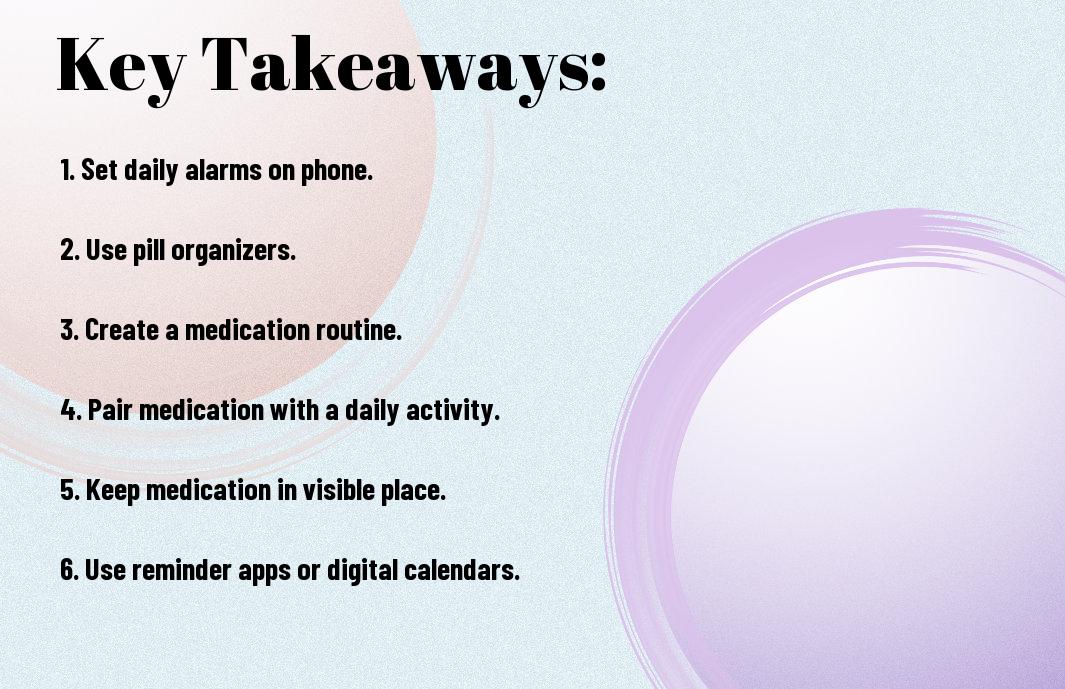
You know the importance of staying consistent with your medication regimen, but sometimes life gets in the way. In this informative blog post, we will share effective tips to help you remember to take your medication on time, every time. By implementing these simple strategies, you can improve your adherence and overall health outcomes. Let’s dive in and discover how to make medication reminders a seamless part of your daily routine.

Key Takeaways:
- Consistency is key: Establishing a routine for taking medication can significantly improve adherence. Setting regular times each day can help in remembering to take prescribed medications.
- Utilize technology: Take advantage of medication reminder apps, alarms, or pill organizers to help remember to take medication on time. These tools can be especially helpful for those with busy schedules.
- Link medication to daily habits: Integrate taking medication into daily routines such as brushing teeth or eating meals. Associating medication with existing habits can make it easier to remember and ensure adherence.

The Importance of Medication Adherence
The Consequences of Non-Adherence
One of the most critical aspects of managing any condition requiring medication is adherence. Non-adherence to medication regimens can lead to a variety of negative consequences, ranging from reduced effectiveness of treatment to worsening health outcomes. For example, if a patient with hypertension fails to take their medication as prescribed, it can result in elevated blood pressure levels, increasing the risk of heart attack or stroke.
The Benefits of Consistent Medication Use
For individuals with chronic illnesses, consistent medication use is imperative for managing symptoms and slowing disease progression. By taking medications as prescribed, patients can experience improved quality of life, better symptom control, and reduced hospitalizations. Additionally, adhering to medication regimens can lead to better long-term health outcomes and lower healthcare costs.
The key to reaping the full benefits of consistent medication use lies in maintaining a routine and integrating medication-taking into daily habits. By incorporating reminders and establishing a support system for medication adherence, individuals can stay on track with their treatments and experience the positive effects of improved health and well-being.
Identifying Your Medication Needs
It is imperative to first identify and understand your medication needs before creating a plan to improve adherence. This involves knowing the names of your medications, their dosage, frequency of intake, and any specific instructions from your healthcare provider. By having a clear understanding of your medication regimen, you can take proactive steps to ensure better adherence and overall health outcomes.
Tracking Your Medication Schedule
Any effective medication reminder strategy starts with tracking your medication schedule. This can be done using a medication tracker or organizer, setting alarms on your phone, or utilizing reminder apps. Consistently tracking your medication schedule helps in establishing a routine and reduces the likelihood of missing doses.
Creating a Personalized Medication Plan
One important aspect of improving medication adherence is creating a personalized medication plan that fits your lifestyle and preferences. This may involve discussing with your healthcare provider about alternative dosing schedules or methods of administration that work best for you.
Plan to involve your support system in your medication plan to help you stay accountable and on track. By involving others in your journey towards better adherence, you increase your chances of successfully managing your medication needs.

Simple yet Effective Reminder Strategies
To Improving Medication Adherence for Chronic Disease, it is important to consider simple yet effective reminder strategies. Here are some strategies that can help you remember to take your medication regularly.
Pill Boxes and Reminders
With pill boxes and reminders, you can organize your medications for each day of the week. This method can help you easily track whether you have taken your medication for the day. Setting up reminders on your phone or using a medication reminder device can also be a helpful tool to ensure you never miss a dose.
Mobile Apps for Medication Reminders
Apps for medication reminders have become increasingly popular in recent years. These mobile apps allow you to set up timely reminders for each of your medications. Some apps even have features where you can input your medication schedule and receive notifications when it’s time to take your pills.
Reminder: When choosing a mobile app for medication reminders, look for one that is user-friendly and allows customization of reminder settings to suit your specific medication needs.
Alarms and Notifications
Apps with alarms and notifications can be a game-changer for medication adherence. You can set up personalized alerts for each medication dosage, ensuring that you never forget to take your pills. These alarms can be programmed to repeat daily, making it a reliable way to stay on track with your medication schedule.
Simple: Using alarms and notifications on your phone is a simple yet effective way to ensure you take your medication on time every day, ultimately improving your adherence to the prescribed treatment plan.
Enlisting Support for Better Adherence
Now, to improve medication adherence, it’s necessary to enlist support from various avenues. One helpful resource is the Medication Adherence Tips: 9 Ways to Stick to Your Medication Schedule resource, providing valuable insights and strategies to help you stay on track with your medications.
Involving Family Members or Caregivers
One effective way to enhance medication adherence is by involving family members or caregivers in the process. They can offer reminders, lend emotional support, and help monitor your medication schedule. By keeping your loved ones informed about your medication regimen, you create a support system that can significantly boost your adherence levels.
Joining a Medication Support Group
For those looking to further enhance their medication adherence, joining a medication support group can be immensely beneficial. These groups provide a platform for individuals dealing with similar challenges to share experiences, offer encouragement, and learn from each other’s strategies for staying consistent with their medication routines.
With the camaraderie and understanding found in these groups, you can gain valuable insights and motivation to stay committed to your medication regimen.
Consulting with a Healthcare Professional
Support from a healthcare professional is crucial for optimal medication adherence. Whether it’s your primary care physician, pharmacist, or a specialized healthcare provider, seeking guidance and advice from these professionals can help address any concerns or challenges you may face in sticking to your medication schedule.
Group your appointments with healthcare professionals can provide personalized strategies, medication adjustments, or alternative options to ensure you are effectively managing your condition through proper medication adherence.
Overcoming Common Barriers to Adherence
Forgetting to Take Medication
Unlike other barriers to medication adherence, such as side effects or financial constraints, forgetting to take medication can be a slippery slope that leads to missed doses and suboptimal health outcomes. To overcome this common issue, it’s vital to implement effective reminder systems. Utilize tools such as daily pill organizers, smartphone apps with alarm features, or setting medication reminders on a smartwatch to help you stay on track with your medication schedule.
Dealing with Side Effects
Barriers to medication adherence like unpleasant side effects can often deter individuals from taking their prescribed medications regularly. It’s crucial to communicate openly with your healthcare provider about any side effects you may experience. Sometimes, a simple adjustment in dosage or switching to a different medication can alleviate these side effects and improve adherence.
A proactive approach to managing side effects involves understanding potential side effects before starting a new medication regimen. By being aware of what to expect, individuals can mentally prepare themselves and seek guidance from healthcare professionals if needed.
Managing Complex Medication Regimens
Regimens with multiple medications taken at different times of the day can be challenging to adhere to. To navigate through this complexity, create a clear and organized schedule outlining when each medication should be taken. Consider using a medication management app that can store your regimen details and send you timely reminders. Additionally, discuss with your healthcare provider the possibility of simplifying your regimen whenever feasible.
Common issues that arise with managing complex medication regimens include confusion about dosages, interactions between medications, and juggling multiple pill bottles. By streamlining your medication routine and seeking guidance from healthcare providers or pharmacists, you can enhance your adherence to treatment plans and promote better health outcomes.
Staying Motivated and Engaged
Once again, staying motivated and engaged with your medication regimen is key to better adherence. It can be challenging to remember to take your medication every day, but there are strategies you can use to stay on track.
Setting Realistic Goals and Rewards
One way to stay motivated is by setting realistic goals and rewards for yourself. Identify specific targets you want to achieve, such as taking your medication every day for a week. Once you reach that goal, reward yourself with something you enjoy, like watching a movie or treating yourself to your favorite meal.
Celebrating Small Victories
One effective way to stay motivated is by celebrating small victories along the way. Each time you successfully remember to take your medication, acknowledge and celebrate that achievement. This positive reinforcement can help you stay engaged with your treatment plan.
Celebrating these small wins can boost your confidence and motivate you to continue your medication regimen. Whether it’s crossing off each day on a calendar or treating yourself to a small reward, find a way to recognize your progress.
Educating Yourself about Your Condition
For a better understanding of your condition and treatment plan, educate yourself by reading reputable sources, talking to your healthcare provider, and joining support groups. The more you know, the more motivated you’ll be to stick to your medication regimen.
Motivated patients who are well-informed about their condition are more likely to actively participate in their treatment and achieve better health outcomes. Take the time to learn about your condition and the importance of medication adherence to stay engaged and motivated.
Summing up
Upon reflecting on the effective medication reminder tips provided in this article, it is evident that adherence to medication regimens is crucial for managing chronic conditions and maintaining overall health. By incorporating simple strategies such as setting alarms, using pill organizers, and leveraging smartphone apps, individuals can significantly improve their medication adherence and ultimately enhance their quality of life. For further exploration on technology’s role in medication adherence, this study on Smartphone medication adherence apps: Potential … offers valuable insights.
FAQ
Q: Why is medication adherence important?
A: Medication adherence is important because it ensures that you receive the full benefits of your prescribed treatment plan, leading to better health outcomes.
Q: What are some common challenges people face with medication adherence?
A: Some common challenges include forgetfulness, side effects, confusion about dosages, and financial constraints.
Q: How can a medication reminder system help improve adherence?
A: A medication reminder system can use alarms, notifications, pill organizers, and smartphone apps to help you stay on track with your medication schedule.
Q: What are some effective medication reminder tips for better adherence?
A: Some effective tips include setting consistent daily routines, using visual cues, enlisting the help of a caregiver, and linking medication-taking to existing habits.
Q: How can I remember to take my medication at the same time every day?
A: You can set an alarm on your phone, associate taking your medication with a specific daily activity, or place your medication in a visible location as reminders.
Q: What should I do if I experience side effects from my medication?
A: If you experience side effects, it’s important to talk to your healthcare provider before making any changes to your medication regimen. They may be able to suggest alternative medications or adjustments to minimize side effects.
Q: How can I stay motivated to adhere to my medication regimen long-term?
A: Staying informed about the benefits of your medication, tracking your progress, and focusing on the positive impact on your health can help you stay motivated to adhere to your medication regimen long-term.


No Comments